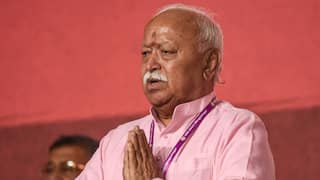How Climate Change Can Impact Indian Crops In The Long Term: Study Provides Insight
Both developed and developing countries have agricultural vulnerability, but there is a huge disparity between the susceptibilities of their agricultural yields to damage from climate change.

Climate change and subsequent extreme weather events such as floods and droughts have a significant impact on agriculture. India is a global agricultural powerhouse, the second largest producer of wheat and rice in the world. According to the World Bank, India has the world’s largest herd of buffaloes, the largest area under wheat, rice and cotton, and is the world’s largest producer of wheat, milk and spices. Climate change has negatively affected India’s crop yields, both in the long term and in the short term.
Both developed and developing countries have agricultural vulnerability, but there is a huge disparity between the susceptibilities of their agricultural yields to damage from climate change. A new study, led by Carl R Woese Institute for Genomic Biology, University of Illinois at Urbana-Champaign, provides new insights into how climate change can impact Indian crops in the long term. It also explores the short-term effects of climate change on the yields of major Indian crops.
The study describing the findings was recently published in the journal Agricultural Economics.
Shifts in weather patterns, such as a hot day with a sudden thunderstorm, are short term. However, long-term differences, such as prolonged periods of heat waves, are the hallmark of climate change. In a statement released by the University of Illinois at Urbana-Champaign, Madhu Khanna, a professor of agriculture, said most studies that measure the effects of climate change focus on year-to-year changes, which are representative of variations in weather and not climate, but the new study has used data across 60 years to examine how deviations in weather from long-term averages affect the yields of three major cereal crops: rice, maize and wheat.
Khanna explained that the researchers wanted to see if the short-term deviations in extreme temperature and precipitation are significant when compared to their long-term averages, and if their effects are absent in the long term because farmers are trying to adapt to climate change.
How the study was conducted
In order to determine if farmers were adapting to the long-term changes in climate change, the researchers used 60-year data sets on temperature, the length of the growing season, precipitation, and crop yield to create different models for short-term and long-term responses of crops.
The study says that if differences in temperature have no impact in either the short-term model or the long-term model, there have been no adaptations. However, if the short-term impact is worse, it implies that the farmers have been able to adapt and smooth out the effects, the study states.
ALSO READ | Eurasian Precipitation Was Below Normal This Year. Know How It Can Favour Stronger Monsoon In India
Indian farmers have been unable to adapt to climate change-induced variations in temperature for wheat
Khanna said the researchers found that the farmers were able to adapt to changes in temperature for rice and maize but not wheat, and that increased precipitation enhanced rice yield, but adversely impacted wheat and maize yields. The team also found that farmers are customising their strategies across different regions and crops. For instance, heat-prone districts fared better to higher temperatures compared to districts in colder regions, the study says.
Differences in ways of adaptation in accordance to productivity
According to the study, farmers who worked in areas that were less productive, and hence, were at the lower tail of distribution, faced more significant adverse effects compared to the farmers who worked in areas where the yields were higher, and hence, were at the upper tail of distribution. The former group of farmers took more adaptation measures due to higher impacts of climate change.
Surendra Kumar, one of the authors on the paper, said since higher productive regions have better irrigation facilities and are less dependent on the monsoon, the difference between long-term and short-term impacts in those areas is negligible.
Crops can adapt in two ways, the study says. The first way is for farmers to change their management practices, and the second way is to change the varieties of crops grown. The study states that action can be taken to improve seed varieties and educate farmers on how they can adapt to changing climate.
Khanna said that the study is a part of the researchers' overall effort to build understanding across different countries. She explained that it is interesting that the results of the study are telling the researchers that in both the United States, where the team conducted a similar study in the past, and India, the crops are adapting, despite the negative impact of climate change.
However, Khanna said, the effects of climate change differ across crops, and the types of effects crops are adapting to also differ from each other. Therefore, a holistic view of all the various ways in which changing climate affects yield is needed, and it is important to understand that focusing on particular dimensions of climate change and adapting crops may not be sufficient.
Since agriculture contributes to about 18 per cent of India’s Gross Domestic Product (GDP), crop damage caused by climate change-induced extreme weather events results in significant economic losses for the country.
“With agriculture contributes to about 18% of India’s Gross Domestic Product (GDP), recent adverse weather conditions, including heavy rain, hailstorms and premature heatwaves, are all the more worrying, causing significant damage to crops and disrupting harvests in North and West India. Indeed, according to recent estimates, the states of Punjab, Haryana and parts of Uttar Pradesh are expected to experience a yield loss. However, India’s wheat production is expected to be higher than last year,” Sumeet Mittal, Country CEO for India at Louis Dreyfus Company, told ABP Live.
He also said that the effects of recent weather changes do not impact crop supply in the short term, but can result in long-term changes if climatic conditions continue to be erratic. For instance, El Niño, which could hit India in May or June, is likely to weaken the southwest monsoon season, and this will affect major Indian crops.
“While the effects of recent weather changes should not impact supply in the short term, they could result in long-term changes if climatic conditions continue to be erratic. In particular, the possibility of El Niño in May or June could weaken the southwest monsoon season, which normally accounts for about 70% of India’s total rainfall, adversely affecting major crops like rice and other cereal grains, sugar and cotton,” Mittal said.
In order to mitigate the impact of weather challenges on the agriculture sector, and wider economy, it is important to provide adequate support to farmers.
“With Indian stocks already at their lowest level in six years, support for affected farmers will be critical in order to mitigate the impact of weather challenges on the agricultural sector and wider economy. Depending on the circumstances, it may also be necessary to allow imports to meet domestic consumption demand, after a ban on exports last year. In this context, it is reassuring to note that the government has already offered impacted farmers compensation and coverage under the crop insurance scheme, especially to support smallholders with more limited resources,” Mittal said.
Related Video
Southern Rising Summit 2024: How Important is Self-Awareness? Insights from Anu Aacharya | ABP LIVE






































